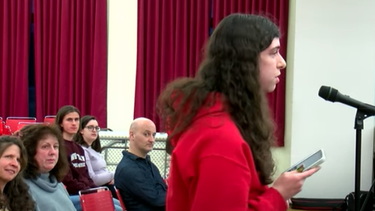GHS music students and parents ‘plant a seed’ to grow more space
GUILDERLAND — School board members on Tuesday sounded receptive to calls for improved music facilities, particularly at the high school.
The board’s March 28 meeting began with an orchestrated chorus of students and parents pointing out space and safety issues with practice rooms and storage spaces for musical instruments.
All of the speakers — four parents and three students — had profuse praise for the music program and teachers at Guilderland.
Julie Petti, president of the Guilderland Music Parents and Friends Association, said close to 350 students participate in high school ensembles supported by “almost 1,000 proud parents.” She noted that music is a curricular subject and any student can participate.
“Nobody is cut,” she said. “Our music programs are actively engaged in making music more inclusive, from linking music to ENL [English as a New Language] programs to providing donated instruments to students in need.”
Petti also listed the many accolades Guilderland students had been accorded and said, “The talent level of our music students is quantifiable.”
But, she asserted, not enough space is allocated for instruction, rehearsals, lessons, and instrument storage.
Erin Kinal, another mother in the association, described the needs as “significant and pressing.”
“Neither the band room or the choral room are large enough to adequately or safely hold rehearsals,” she said.
Since the high school stage is used for rehearsals, she said, “Teachers and students must take time from each class to set up and take down chairs, stand sets, and more. Large instruments like grand pianos must be moved back and forth.”
She said, too, that there is no space for students to gather outside of class after school to play music together. “This is a huge missed opportunity for our students,” she concluded.
Kris Hacker, a father with children in the school music program, maintained that not having secure storage can cause “thousands of dollars worth of damage to instruments.” He gave the example of a neck strap on a bass that cost thousands of dollars
Fixing damaged instruments, he said, places a financial burden on students and the association “because they are considerate enough to pay for those repairs.”
He also asserted, “Somebody is going to get hurt,” walking through the hallways with large instruments.
Tom Wallner, the father of two Guilderland music students, said that, as a musician with the Michigan Tech jazz band, he had traveled throughout the Midwest, seeing rural schools, Detroit inner-city schools, and suburban schools.
When he saw the music facilities at Guilderland High School, he said he was “resoundingly embarrassed.” He was “flabbergasted” that there is not a band room with tiered seating and without a “recording infrastructure where a teacher can record a rehearsal and then play it back to the students and say … ‘now you can hear where you’re making mistakes.’”
“We don’t necessarily need to be number one,” he concluded, “but I think I’d like to not be embarrassed.”
Olivia Petti, a Guilderland junior, is in the wind ensemble, jazz band, concert choir, chamber choir, and has been in several Guilderland Players’ productions, she said.
“When ensemble rehearsals are only 40 minutes long,” she said, “we can’t afford to spend five or 10 minutes fixing our rehearsal space.”
Acting students face the same problem, readying a stage for rehearsal by removing instruments.
“In every other class I’m in,” said Petti, “the classrooms are ready to go when they start. Our music program deserves the same.”
Junior Hazel Regan, who is in the symphony orchestra, concert choir and chamber choir, is also co-president of the Tri-M Music Honor society, she said, adding that she has been in seven shows with the Guilderland Players.
“We have virtually no backstage area because instruments have no alternative storage space ….,” said Regan. “This constant reshuffling is a huge distraction and it takes away time and focus from these valuable academic classes.”
Another junior, Hannah Bowman, who plays in the jazz ensemble and the wind ensemble, said playing the trumpet means the world to her.
“We have incredible students and teachers,” she said, “but our band program is lacking. It’s not good; it’s not good at all.”
She went on, “Not only are we lugging around giant instruments that cost thousands of dollars, we also have to share the space with the symphonic band, which has upwards of 60 or 70 kids in it. That’s a fire hazard and a hazard if you have to get out of the school for some reason.”
Bowman also spoke passionately about how many students are planning careers in music and said, “It’s more than just about the class to us. Music is a way for us to release our emotions.”
After the speakers had had their say, board President Seema Rivera responded, “I think the seed has been planted.”
The request for more dedicated space for the music program she said is “probably the start of a longer discussion.”
Board member Blanca Gonzalez-Parker said, “I didn’t know about the space issue so I appreciate the detail and the time that you spent preparing your comments.”
She suggested that a subcommittee, similar to the one that “explored the turf field” — which is now a reality had the high school, having been passed as a capital project — could be set up.
Rivera said the request for expanded music facilities intersects with one of the board’s goals — opportunities for equity for all students.
She also said the board’s business practices committee could discuss it as part of a future capital project.
“This really plants a seed,” Rivera reiterated, “because this is the first time I’m hearing this, and I love hearing from the students.”
Other topics
The board also heard comments on March 28 from district residents on three other topics:
— Robert DiPasquale spoke to the school board for the second time on the importance of recess for students. He lamented that the district’s middle school has no recess and that, at the five elementary schools, going outside for recess is left to the discretion of individual teachers.
DiPasquale cited research that he said shows recess is “profoundly important to a child’s education for mental, physical, and social well being.”
His son, who is new to Farnsworth Middle school, DiPasquale said, “has no opportunity to meet his other classmates”;
— Heard a request from Keith Kizer that the board “report the totality of school system resources directed to the threat of mass shootings,” which he said “should include the hours of school time spent by students on active shooter drills, the costs of insurance, security personnel, legal consultations, teachers, and school staff.”
Kizer said that this would raise the “community’s awareness that the threat of mass shootings impacts all Americans”; and
— Heard jointly, in an email, from Sarah Kate Kanter and Joseph Wade that, in the wake of the March 27 school shooting in Nashville, they “are deeply concerned about the mental and physical safety of trans and nonbinary people in the U.S.”
Don Aaron, a Nashville Police spokesman, said of the 28-year-old killed by police for the shooting, “Audrey Hale is a biological woman who, on a social media profile, used male pronouns.”
Kanter and Wade said the “shooting will unfortunately only further inflame the intolerance and bigotry” and urged a statement from the Guilderland administration “expressing strong support for the district’s trans and nonbinary students and employees



